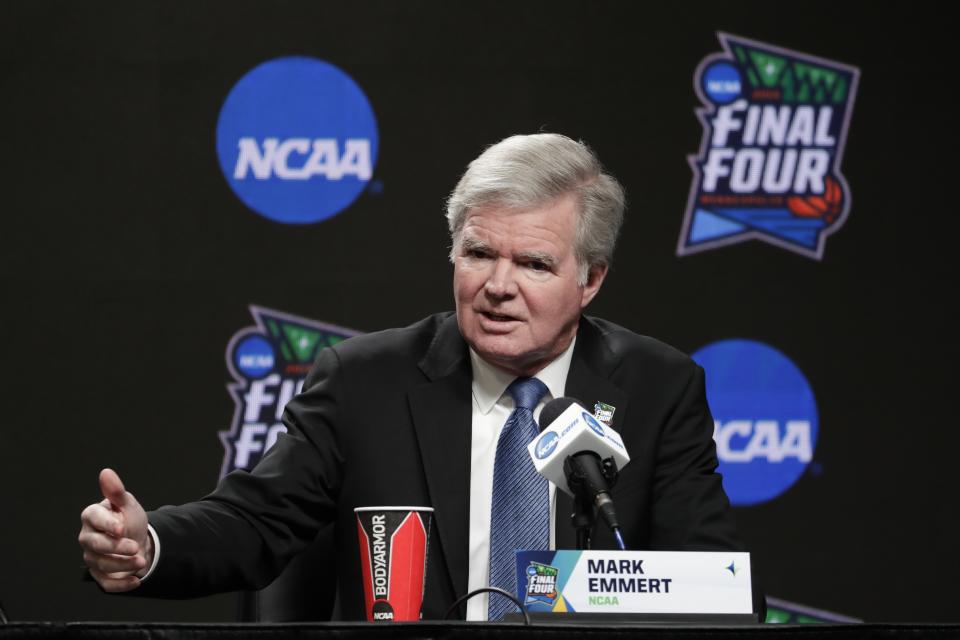Senators critical of NCAA NIL recommendations in letter to Mark Emmert
Last week, the NCAA took a big step toward allowing college athletes to be compensated for the use of their name, image and likeness. To two U.S. senators, however, it wasn’t a big enough step.
According to Sports Illustrated, Senators Cory Booker (D-N.J.) and Chris Murphy (D-Conn.) sent a letter to NCAA president Mark Emmert on Tuesday saying that the recommendations on NIL payments laid out by an NCAA working group do not “come close to providing college athletes with the rights and opportunities they deserve.”
The recommendations released by the NCAA last week only serve as a framework for the rules system it aims to have in place by January 2021. The NCAA would allow college athletes to be compensated by a third party for endorsement deals, making personal appearances, signing autographs and for promoting products on social media.
However, these deals are expected to stay within specific “guardrails,” including regulating the use of “agents and advisors” in brokering deals and having financial transactions disclosed to universities.
According to Booker and Murphy, these guardrails are restrictive and could actually limit the ability for college athletes to be compensated for their NIL.
The NCAA’s framework for NIL and third-party endorsements represents both a step forward and a step back. Yes, the framework describes a goal of creating the opportunity for athletes to be paid for NIL rights, but it also says that these opportunities will be restricted by what the report calls “guardrails.” Thus, it remains completely uncertain how the NCAA will determine an athlete’s endorsement deal fits within its proposed guardrails and whether those guardrails will be so restrictive, the rules so byzantine, and the penalties so onerous, that students will in fact have no meaningful ability to receive compensation for NIL rights.
NCAA wants federal preemption from Congress
The NCAA was forced into a corner on NIL reform when individual states began drafting and passing bills to allow college athletes in their own states to be compensated. NIL rules differing from state-to-state would significantly hinder the NCAA’s ability to oversee universities on a national scale.
Because of that, the NCAA wants Congress to implement a “federal preemption” over name, image and likeness laws and to establish a “safe harbor” for the NCAA to “provide protection against lawsuits filed for name, image and likeness rules” while “safeguarding” the “non-employment status” of student-athletes and “maintaining the distinction between college athletes and professional athletes.”

In their letter, Booker and Murphy are saying “not so fast” to those requests. If the NCAA wants Congressional protection, the two senators believe the NCAA should push past just NIL compensation, saying that “too many college athletes fall victim to a system that puts their health and safety secondary to winning and generating revenue.”
The report contemplates Congress passing legislation that will grant college athletic programs broad immunities from state regulation and legal claims. These requests are potentially sweeping in scope, and we believe that any protection that Congress grants the NCAA or its members from legislative or legal proceedings should be met with a broad series of reforms that advance college athlete protections.
California led the charge by drafting its own NIL law last year. Many other states have followed, with Florida expected to have its law — which allows for more compensation options than the NCAA’s recommendations — go into effect in July 2021. Meanwhile, lawmakers in both the House of Representatives and Senate have moved toward establishing federal NIL legislation.
Most legislators involved are pushing for a more-developed package of reforms than the NCAA’s early framework. In their letter, Booker and Murphy say they are “encouraged” by the NCAA’s “progress” on the issue, but still want “broader reforms.”
“We believe that the report’s recommendations inadequately advance the interests of college athletes, and we further believe that any legal protections granted to NCAA members by Congress should be met with broader reforms that address the health and well-being of athletes,” the letter says. “We are encouraged by the NCAA’s progress on addressing third-party endorsements. This movement in the right direction is important. But we urge the NCAA to go further in reforming a broken system, and we look forward to working with you and your members in this effort.”
More from Yahoo Sports:

